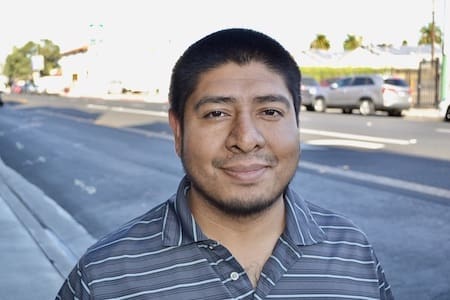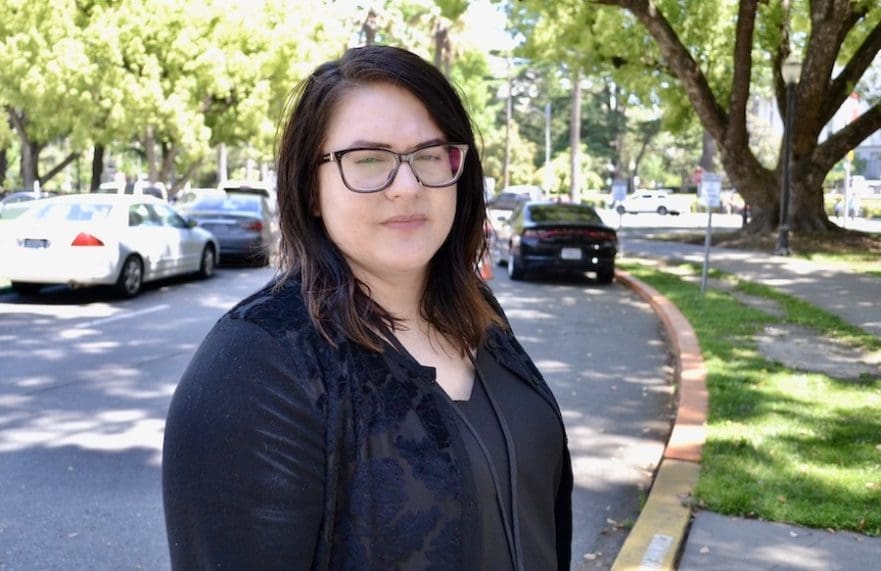Last year, I visited housing activists throughout California, asking them about the street-level impacts of gentrification and unfair, sky-high rents in their cities. We also talked about the powerful influence of the real estate industry on local politicians. All of these things, I learned, were ravaging their middle- and working-class communities. As one can imagine, the coronavirus pandemic is only making a horrible situation worse.
“People have been unemployed for weeks and unemployment checks are not coming in with the slow unemployment insurance process,” San Diego Tenants Union Co-Director Rafael Bautista told me the other day. “Federal checks are not going to be received for another few weeks, and not everyone will receive those funds. The system has failed us, and if nothing changes, hundreds of thousands of unemployed tenants will have little to no option but to skip rent to survive.”
Bautista and Sacramento Tenants Union member Erica Jaramillo (pictured above) have been battling on the frontlines of California’s housing affordability crisis for years. Bautista has seen San Diego politicians push a pro-gentrification, trickle-down housing agenda that’s enriched the real estate industry, but has driven up rents and fueled displacement in such working-class neighborhoods as City Heights.

“The people who were living here are leaving,” Bautista, a 35-year-old San Diego native, explained to me last November. “It’s sad. We have people telling us they’ll go back to Mexico. We have other people who say they’ll go back to the Philippines or Iran. And people are going to Texas and Arizona because they’re paying more than half of their incomes on rents. A major rent increase can destroy a person’s life.”
Jaramillo, in Sacramento, witnessed something eerily similar.
“There’s no political will to help us,” Jaramillo, a 31-year-old government worker who was born and raised in Sacramento, told me last May. “There’s no one here for us. The politicians are making sweet deals for themselves [with the real estate industry], and not helping us.”
Jaramillo and the Sacramento Tenants Union were seeing middle- and working-class residents get hit with 20 and 30 percent rent increases.
Today, Jaramillo told me this week, the coronavirus pandemic is only adding more weight to the financial burdens residents were already carrying.
“Across the board,” she explained, “we are hearing that the response renters are getting from landlords is, ‘I still have a mortgage to pay and you still need to pay rent.’ The real disaster for tenants is going to be after the coronavirus — because we are still going to be expected to pay back rent 120 days from May 31. We aren’t all going to have that money to pay the rent back.”
In San Diego, Bautista said, “Tenants are facing a real life struggle between paying rent and paying for food and medications.”
He added, “The coronavirus has made it abundantly clear that working people deserve more, but are still the last priority for this government.”
There are now efforts in San Diego and Sacramento, as well as other California cities, to carry out possible rent strikes.
“People don’t want to do it,” Bautista explained to the San Diego Union-Tribune. “They have to do it.”
Jaramillo told me, “The Sacramento Tenants Union has been organizing and speaking to tenants for the last three years. What we know is that many renters, prior to the coronavirus, were already struggling to make ends meet. The pandemic makes this startling clear.”
Bautista, Jaramillo, and other activists are now waiting to see how state and local politicians will handle the unfolding coronavirus crisis.
“We desperately need our elected officials,” said Jaramillo, “particularly our governor, who has the executive power, to put the working class, who are taxpayers and the essential workers across California, first. I can’t speak for all renters, but I can speak for the Sacramento Tenants Union: we will not forget how our elected leaders acted during this pandemic and how they treated us.”

